Commercial Law: Scottish Civil Court Structure, Cases, and Personnel
VerifiedAdded on 2020/12/10
|9
|2036
|123
Report
AI Summary
This report provides a comprehensive overview of the Scottish civil court structure, detailing the different levels of courts, including the Sheriff Court, Sheriff Appeal Court, Court of Session, and the UK Supreme Court. It outlines the types of civil cases heard in these courts, such as those related to debt, housing disputes, divorce, dissolution of civil partnerships, parental rights, adoption, and road crash compensation. Furthermore, the report identifies the key legal personnel involved in civil proceedings, including solicitors, solicitor-advocates, advocates, and the judiciary (Sheriffs, Sheriff Principals, and the Scottish Law Lords), and the Law Officers. The report concludes that the Scottish legal system regulates all legal procedures within Scotland and England, with civil courts focusing on compensation rather than punishment. This analysis of the structure, case types, and personnel provides a clear understanding of the civil justice system in Scotland.

Commercial law
Paraphrase This Document
Need a fresh take? Get an instant paraphrase of this document with our AI Paraphraser
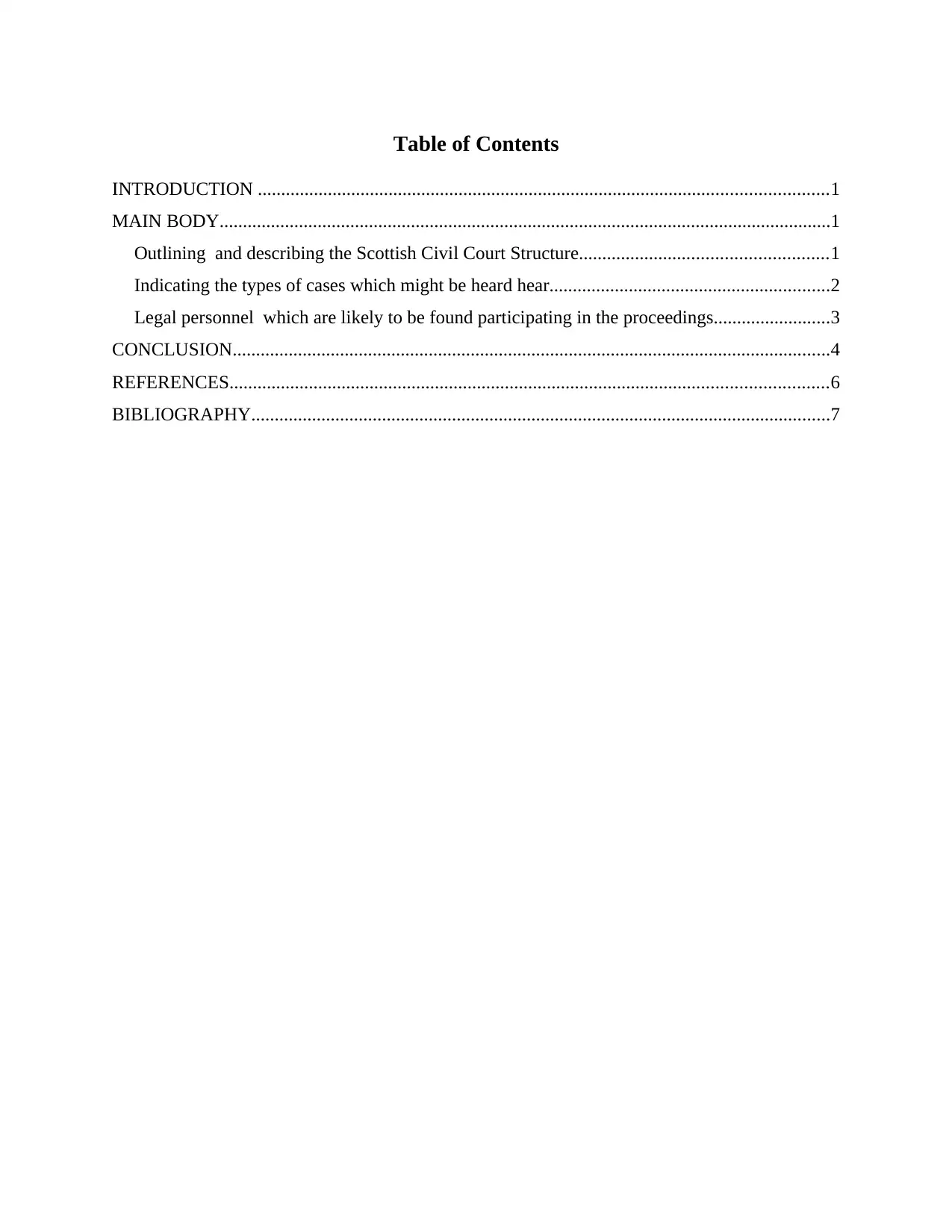
Table of Contents
INTRODUCTION ..........................................................................................................................1
MAIN BODY...................................................................................................................................1
Outlining and describing the Scottish Civil Court Structure.....................................................1
Indicating the types of cases which might be heard hear............................................................2
Legal personnel which are likely to be found participating in the proceedings.........................3
CONCLUSION................................................................................................................................4
REFERENCES................................................................................................................................6
BIBLIOGRAPHY............................................................................................................................7
INTRODUCTION ..........................................................................................................................1
MAIN BODY...................................................................................................................................1
Outlining and describing the Scottish Civil Court Structure.....................................................1
Indicating the types of cases which might be heard hear............................................................2
Legal personnel which are likely to be found participating in the proceedings.........................3
CONCLUSION................................................................................................................................4
REFERENCES................................................................................................................................6
BIBLIOGRAPHY............................................................................................................................7
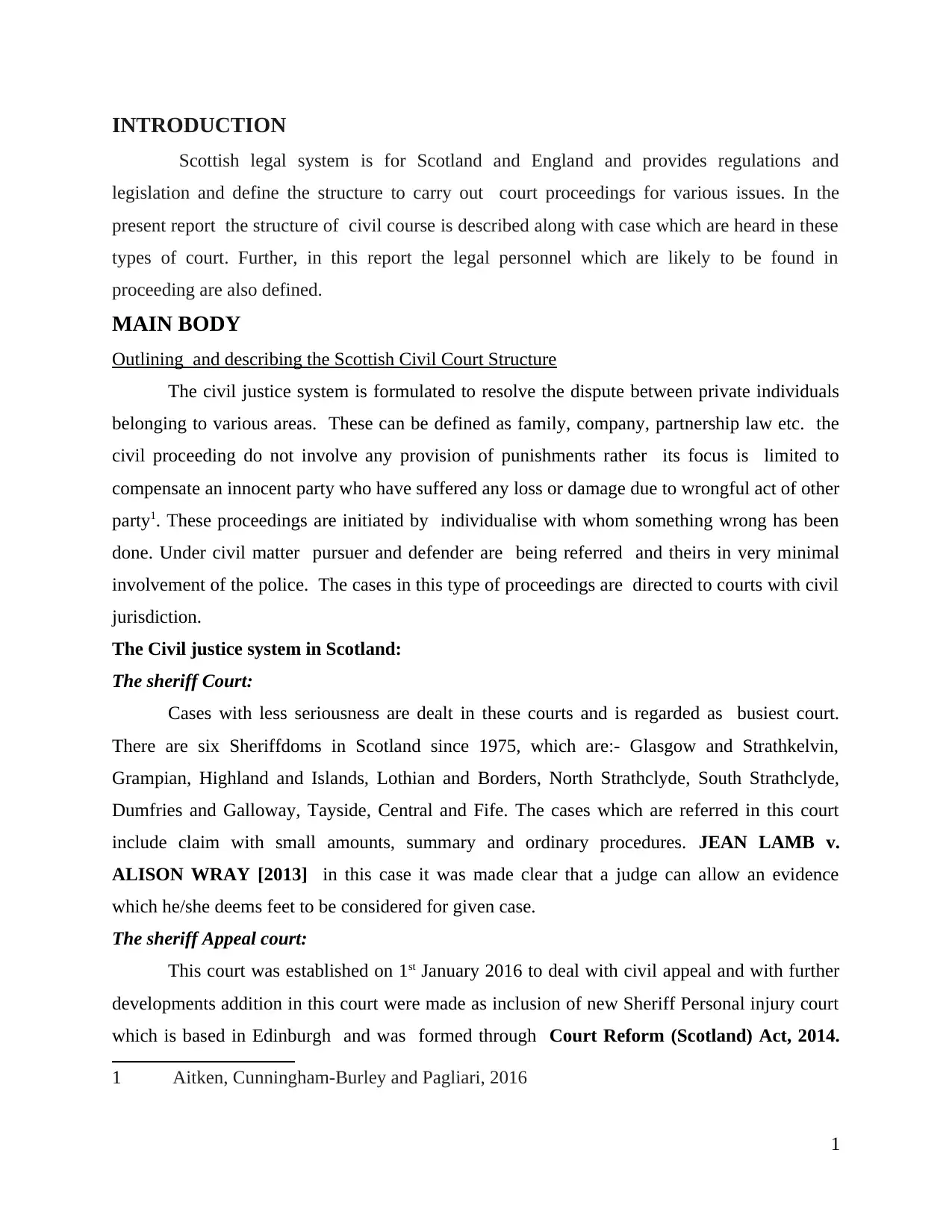
INTRODUCTION
Scottish legal system is for Scotland and England and provides regulations and
legislation and define the structure to carry out court proceedings for various issues. In the
present report the structure of civil course is described along with case which are heard in these
types of court. Further, in this report the legal personnel which are likely to be found in
proceeding are also defined.
MAIN BODY
Outlining and describing the Scottish Civil Court Structure
The civil justice system is formulated to resolve the dispute between private individuals
belonging to various areas. These can be defined as family, company, partnership law etc. the
civil proceeding do not involve any provision of punishments rather its focus is limited to
compensate an innocent party who have suffered any loss or damage due to wrongful act of other
party1. These proceedings are initiated by individualise with whom something wrong has been
done. Under civil matter pursuer and defender are being referred and theirs in very minimal
involvement of the police. The cases in this type of proceedings are directed to courts with civil
jurisdiction.
The Civil justice system in Scotland:
The sheriff Court:
Cases with less seriousness are dealt in these courts and is regarded as busiest court.
There are six Sheriffdoms in Scotland since 1975, which are:- Glasgow and Strathkelvin,
Grampian, Highland and Islands, Lothian and Borders, North Strathclyde, South Strathclyde,
Dumfries and Galloway, Tayside, Central and Fife. The cases which are referred in this court
include claim with small amounts, summary and ordinary procedures. JEAN LAMB v.
ALISON WRAY [2013] in this case it was made clear that a judge can allow an evidence
which he/she deems feet to be considered for given case.
The sheriff Appeal court:
This court was established on 1st January 2016 to deal with civil appeal and with further
developments addition in this court were made as inclusion of new Sheriff Personal injury court
which is based in Edinburgh and was formed through Court Reform (Scotland) Act, 2014.
1 Aitken, Cunningham-Burley and Pagliari, 2016
1
Scottish legal system is for Scotland and England and provides regulations and
legislation and define the structure to carry out court proceedings for various issues. In the
present report the structure of civil course is described along with case which are heard in these
types of court. Further, in this report the legal personnel which are likely to be found in
proceeding are also defined.
MAIN BODY
Outlining and describing the Scottish Civil Court Structure
The civil justice system is formulated to resolve the dispute between private individuals
belonging to various areas. These can be defined as family, company, partnership law etc. the
civil proceeding do not involve any provision of punishments rather its focus is limited to
compensate an innocent party who have suffered any loss or damage due to wrongful act of other
party1. These proceedings are initiated by individualise with whom something wrong has been
done. Under civil matter pursuer and defender are being referred and theirs in very minimal
involvement of the police. The cases in this type of proceedings are directed to courts with civil
jurisdiction.
The Civil justice system in Scotland:
The sheriff Court:
Cases with less seriousness are dealt in these courts and is regarded as busiest court.
There are six Sheriffdoms in Scotland since 1975, which are:- Glasgow and Strathkelvin,
Grampian, Highland and Islands, Lothian and Borders, North Strathclyde, South Strathclyde,
Dumfries and Galloway, Tayside, Central and Fife. The cases which are referred in this court
include claim with small amounts, summary and ordinary procedures. JEAN LAMB v.
ALISON WRAY [2013] in this case it was made clear that a judge can allow an evidence
which he/she deems feet to be considered for given case.
The sheriff Appeal court:
This court was established on 1st January 2016 to deal with civil appeal and with further
developments addition in this court were made as inclusion of new Sheriff Personal injury court
which is based in Edinburgh and was formed through Court Reform (Scotland) Act, 2014.
1 Aitken, Cunningham-Burley and Pagliari, 2016
1
⊘ This is a preview!⊘
Do you want full access?
Subscribe today to unlock all pages.

Trusted by 1+ million students worldwide
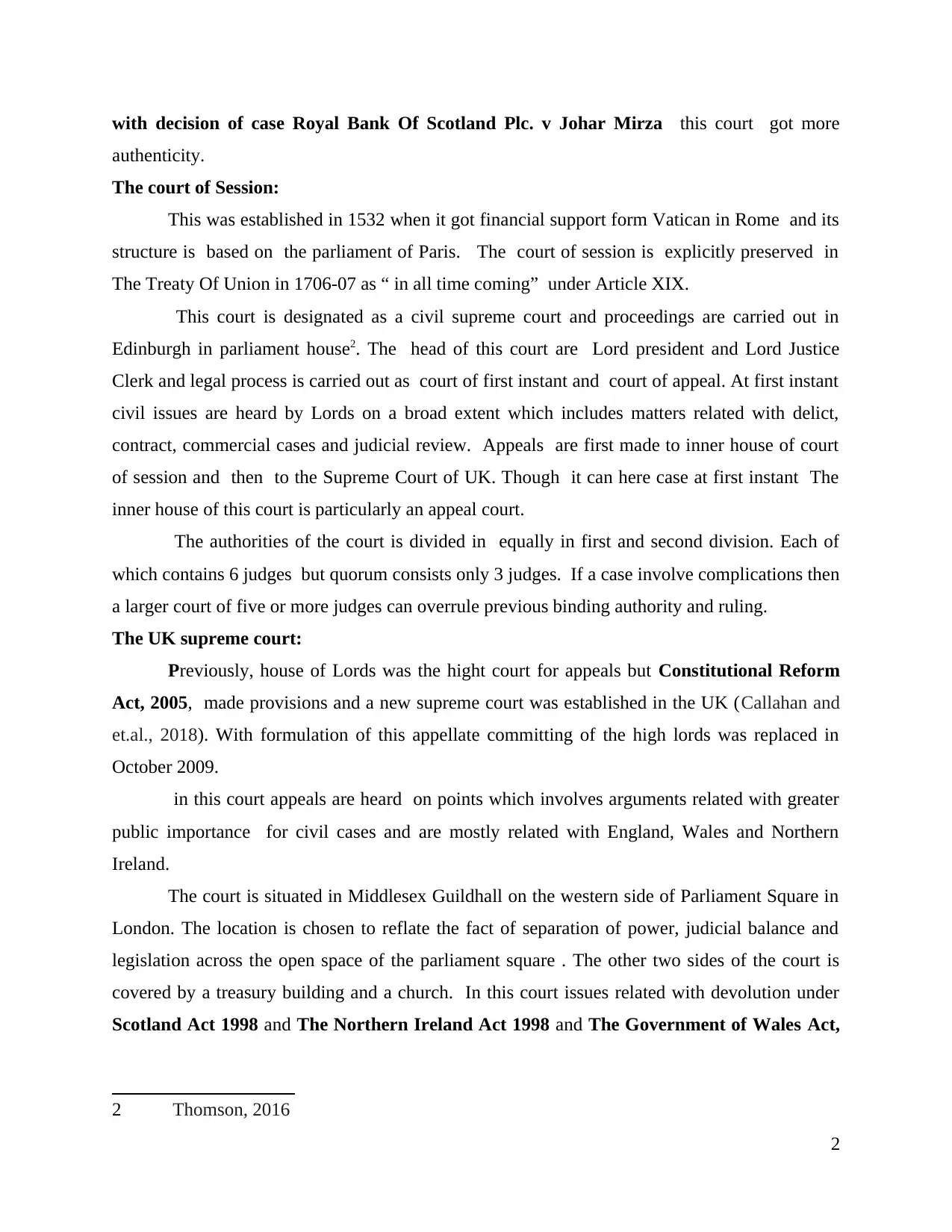
with decision of case Royal Bank Of Scotland Plc. v Johar Mirza this court got more
authenticity.
The court of Session:
This was established in 1532 when it got financial support form Vatican in Rome and its
structure is based on the parliament of Paris. The court of session is explicitly preserved in
The Treaty Of Union in 1706-07 as “ in all time coming” under Article XIX.
This court is designated as a civil supreme court and proceedings are carried out in
Edinburgh in parliament house2. The head of this court are Lord president and Lord Justice
Clerk and legal process is carried out as court of first instant and court of appeal. At first instant
civil issues are heard by Lords on a broad extent which includes matters related with delict,
contract, commercial cases and judicial review. Appeals are first made to inner house of court
of session and then to the Supreme Court of UK. Though it can here case at first instant The
inner house of this court is particularly an appeal court.
The authorities of the court is divided in equally in first and second division. Each of
which contains 6 judges but quorum consists only 3 judges. If a case involve complications then
a larger court of five or more judges can overrule previous binding authority and ruling.
The UK supreme court:
Previously, house of Lords was the hight court for appeals but Constitutional Reform
Act, 2005, made provisions and a new supreme court was established in the UK (Callahan and
et.al., 2018). With formulation of this appellate committing of the high lords was replaced in
October 2009.
in this court appeals are heard on points which involves arguments related with greater
public importance for civil cases and are mostly related with England, Wales and Northern
Ireland.
The court is situated in Middlesex Guildhall on the western side of Parliament Square in
London. The location is chosen to reflate the fact of separation of power, judicial balance and
legislation across the open space of the parliament square . The other two sides of the court is
covered by a treasury building and a church. In this court issues related with devolution under
Scotland Act 1998 and The Northern Ireland Act 1998 and The Government of Wales Act,
2 Thomson, 2016
2
authenticity.
The court of Session:
This was established in 1532 when it got financial support form Vatican in Rome and its
structure is based on the parliament of Paris. The court of session is explicitly preserved in
The Treaty Of Union in 1706-07 as “ in all time coming” under Article XIX.
This court is designated as a civil supreme court and proceedings are carried out in
Edinburgh in parliament house2. The head of this court are Lord president and Lord Justice
Clerk and legal process is carried out as court of first instant and court of appeal. At first instant
civil issues are heard by Lords on a broad extent which includes matters related with delict,
contract, commercial cases and judicial review. Appeals are first made to inner house of court
of session and then to the Supreme Court of UK. Though it can here case at first instant The
inner house of this court is particularly an appeal court.
The authorities of the court is divided in equally in first and second division. Each of
which contains 6 judges but quorum consists only 3 judges. If a case involve complications then
a larger court of five or more judges can overrule previous binding authority and ruling.
The UK supreme court:
Previously, house of Lords was the hight court for appeals but Constitutional Reform
Act, 2005, made provisions and a new supreme court was established in the UK (Callahan and
et.al., 2018). With formulation of this appellate committing of the high lords was replaced in
October 2009.
in this court appeals are heard on points which involves arguments related with greater
public importance for civil cases and are mostly related with England, Wales and Northern
Ireland.
The court is situated in Middlesex Guildhall on the western side of Parliament Square in
London. The location is chosen to reflate the fact of separation of power, judicial balance and
legislation across the open space of the parliament square . The other two sides of the court is
covered by a treasury building and a church. In this court issues related with devolution under
Scotland Act 1998 and The Northern Ireland Act 1998 and The Government of Wales Act,
2 Thomson, 2016
2
Paraphrase This Document
Need a fresh take? Get an instant paraphrase of this document with our AI Paraphraser
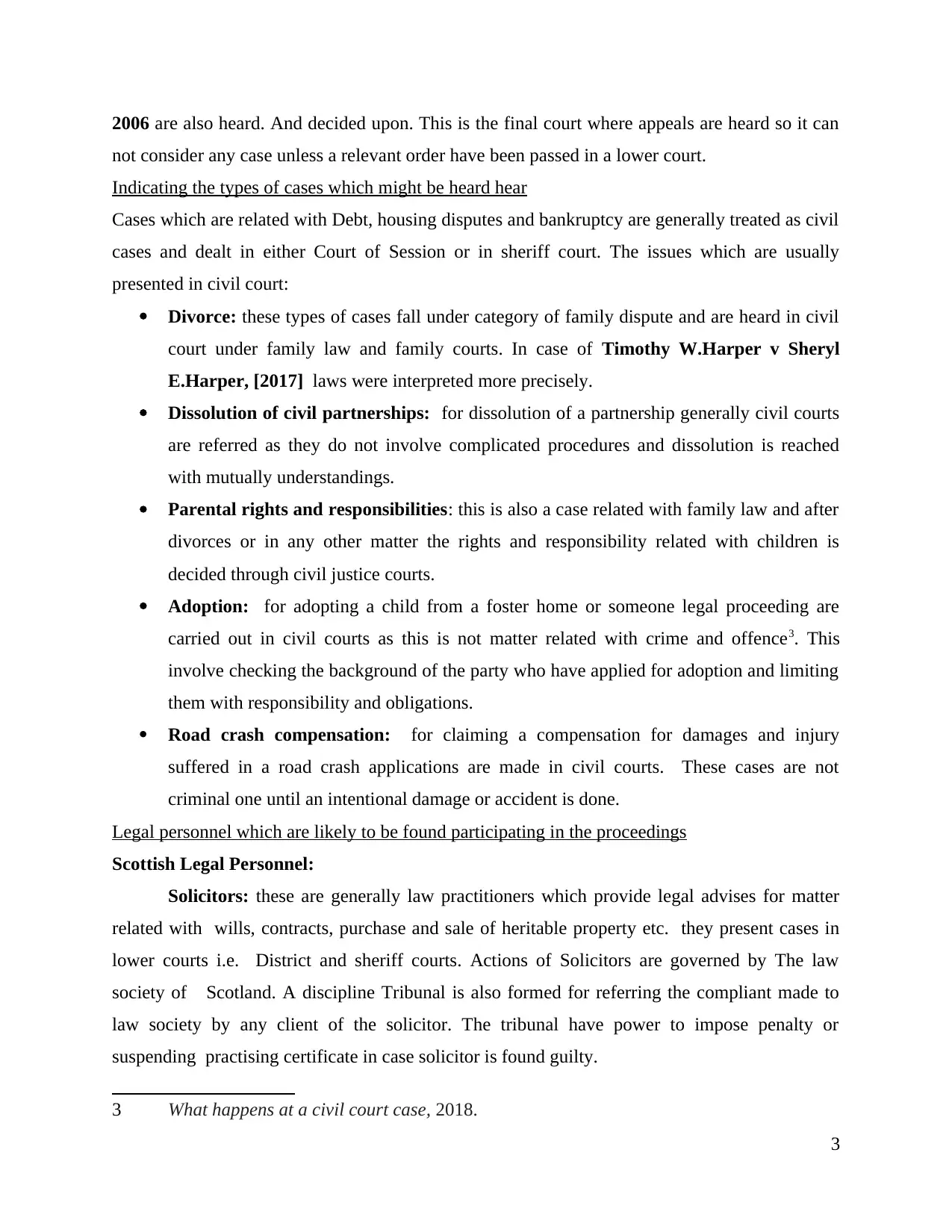
2006 are also heard. And decided upon. This is the final court where appeals are heard so it can
not consider any case unless a relevant order have been passed in a lower court.
Indicating the types of cases which might be heard hear
Cases which are related with Debt, housing disputes and bankruptcy are generally treated as civil
cases and dealt in either Court of Session or in sheriff court. The issues which are usually
presented in civil court:
Divorce: these types of cases fall under category of family dispute and are heard in civil
court under family law and family courts. In case of Timothy W.Harper v Sheryl
E.Harper, [2017] laws were interpreted more precisely.
Dissolution of civil partnerships: for dissolution of a partnership generally civil courts
are referred as they do not involve complicated procedures and dissolution is reached
with mutually understandings.
Parental rights and responsibilities: this is also a case related with family law and after
divorces or in any other matter the rights and responsibility related with children is
decided through civil justice courts.
Adoption: for adopting a child from a foster home or someone legal proceeding are
carried out in civil courts as this is not matter related with crime and offence3. This
involve checking the background of the party who have applied for adoption and limiting
them with responsibility and obligations.
Road crash compensation: for claiming a compensation for damages and injury
suffered in a road crash applications are made in civil courts. These cases are not
criminal one until an intentional damage or accident is done.
Legal personnel which are likely to be found participating in the proceedings
Scottish Legal Personnel:
Solicitors: these are generally law practitioners which provide legal advises for matter
related with wills, contracts, purchase and sale of heritable property etc. they present cases in
lower courts i.e. District and sheriff courts. Actions of Solicitors are governed by The law
society of Scotland. A discipline Tribunal is also formed for referring the compliant made to
law society by any client of the solicitor. The tribunal have power to impose penalty or
suspending practising certificate in case solicitor is found guilty.
3 What happens at a civil court case, 2018.
3
not consider any case unless a relevant order have been passed in a lower court.
Indicating the types of cases which might be heard hear
Cases which are related with Debt, housing disputes and bankruptcy are generally treated as civil
cases and dealt in either Court of Session or in sheriff court. The issues which are usually
presented in civil court:
Divorce: these types of cases fall under category of family dispute and are heard in civil
court under family law and family courts. In case of Timothy W.Harper v Sheryl
E.Harper, [2017] laws were interpreted more precisely.
Dissolution of civil partnerships: for dissolution of a partnership generally civil courts
are referred as they do not involve complicated procedures and dissolution is reached
with mutually understandings.
Parental rights and responsibilities: this is also a case related with family law and after
divorces or in any other matter the rights and responsibility related with children is
decided through civil justice courts.
Adoption: for adopting a child from a foster home or someone legal proceeding are
carried out in civil courts as this is not matter related with crime and offence3. This
involve checking the background of the party who have applied for adoption and limiting
them with responsibility and obligations.
Road crash compensation: for claiming a compensation for damages and injury
suffered in a road crash applications are made in civil courts. These cases are not
criminal one until an intentional damage or accident is done.
Legal personnel which are likely to be found participating in the proceedings
Scottish Legal Personnel:
Solicitors: these are generally law practitioners which provide legal advises for matter
related with wills, contracts, purchase and sale of heritable property etc. they present cases in
lower courts i.e. District and sheriff courts. Actions of Solicitors are governed by The law
society of Scotland. A discipline Tribunal is also formed for referring the compliant made to
law society by any client of the solicitor. The tribunal have power to impose penalty or
suspending practising certificate in case solicitor is found guilty.
3 What happens at a civil court case, 2018.
3
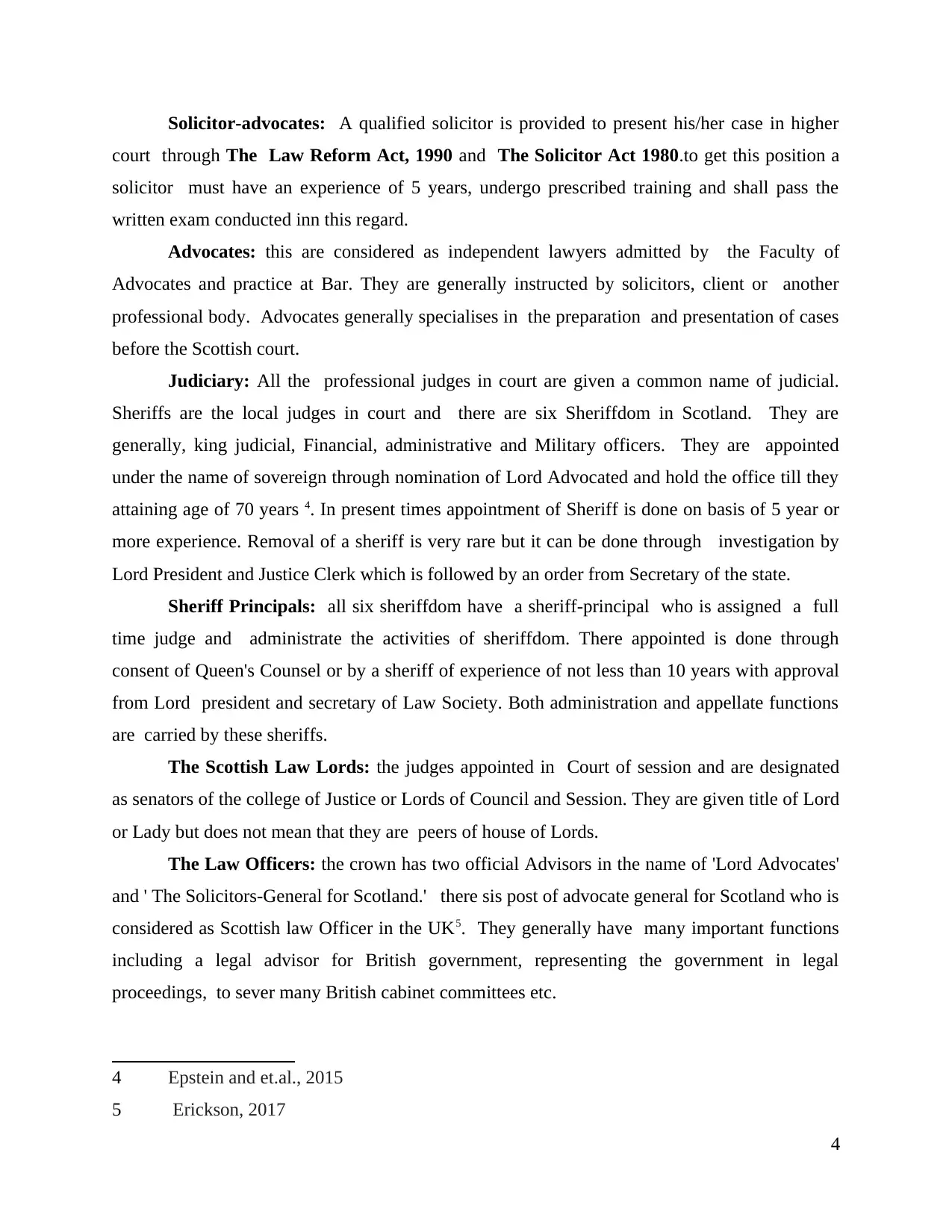
Solicitor-advocates: A qualified solicitor is provided to present his/her case in higher
court through The Law Reform Act, 1990 and The Solicitor Act 1980.to get this position a
solicitor must have an experience of 5 years, undergo prescribed training and shall pass the
written exam conducted inn this regard.
Advocates: this are considered as independent lawyers admitted by the Faculty of
Advocates and practice at Bar. They are generally instructed by solicitors, client or another
professional body. Advocates generally specialises in the preparation and presentation of cases
before the Scottish court.
Judiciary: All the professional judges in court are given a common name of judicial.
Sheriffs are the local judges in court and there are six Sheriffdom in Scotland. They are
generally, king judicial, Financial, administrative and Military officers. They are appointed
under the name of sovereign through nomination of Lord Advocated and hold the office till they
attaining age of 70 years 4. In present times appointment of Sheriff is done on basis of 5 year or
more experience. Removal of a sheriff is very rare but it can be done through investigation by
Lord President and Justice Clerk which is followed by an order from Secretary of the state.
Sheriff Principals: all six sheriffdom have a sheriff-principal who is assigned a full
time judge and administrate the activities of sheriffdom. There appointed is done through
consent of Queen's Counsel or by a sheriff of experience of not less than 10 years with approval
from Lord president and secretary of Law Society. Both administration and appellate functions
are carried by these sheriffs.
The Scottish Law Lords: the judges appointed in Court of session and are designated
as senators of the college of Justice or Lords of Council and Session. They are given title of Lord
or Lady but does not mean that they are peers of house of Lords.
The Law Officers: the crown has two official Advisors in the name of 'Lord Advocates'
and ' The Solicitors-General for Scotland.' there sis post of advocate general for Scotland who is
considered as Scottish law Officer in the UK5. They generally have many important functions
including a legal advisor for British government, representing the government in legal
proceedings, to sever many British cabinet committees etc.
4 Epstein and et.al., 2015
5 Erickson, 2017
4
court through The Law Reform Act, 1990 and The Solicitor Act 1980.to get this position a
solicitor must have an experience of 5 years, undergo prescribed training and shall pass the
written exam conducted inn this regard.
Advocates: this are considered as independent lawyers admitted by the Faculty of
Advocates and practice at Bar. They are generally instructed by solicitors, client or another
professional body. Advocates generally specialises in the preparation and presentation of cases
before the Scottish court.
Judiciary: All the professional judges in court are given a common name of judicial.
Sheriffs are the local judges in court and there are six Sheriffdom in Scotland. They are
generally, king judicial, Financial, administrative and Military officers. They are appointed
under the name of sovereign through nomination of Lord Advocated and hold the office till they
attaining age of 70 years 4. In present times appointment of Sheriff is done on basis of 5 year or
more experience. Removal of a sheriff is very rare but it can be done through investigation by
Lord President and Justice Clerk which is followed by an order from Secretary of the state.
Sheriff Principals: all six sheriffdom have a sheriff-principal who is assigned a full
time judge and administrate the activities of sheriffdom. There appointed is done through
consent of Queen's Counsel or by a sheriff of experience of not less than 10 years with approval
from Lord president and secretary of Law Society. Both administration and appellate functions
are carried by these sheriffs.
The Scottish Law Lords: the judges appointed in Court of session and are designated
as senators of the college of Justice or Lords of Council and Session. They are given title of Lord
or Lady but does not mean that they are peers of house of Lords.
The Law Officers: the crown has two official Advisors in the name of 'Lord Advocates'
and ' The Solicitors-General for Scotland.' there sis post of advocate general for Scotland who is
considered as Scottish law Officer in the UK5. They generally have many important functions
including a legal advisor for British government, representing the government in legal
proceedings, to sever many British cabinet committees etc.
4 Epstein and et.al., 2015
5 Erickson, 2017
4
⊘ This is a preview!⊘
Do you want full access?
Subscribe today to unlock all pages.

Trusted by 1+ million students worldwide
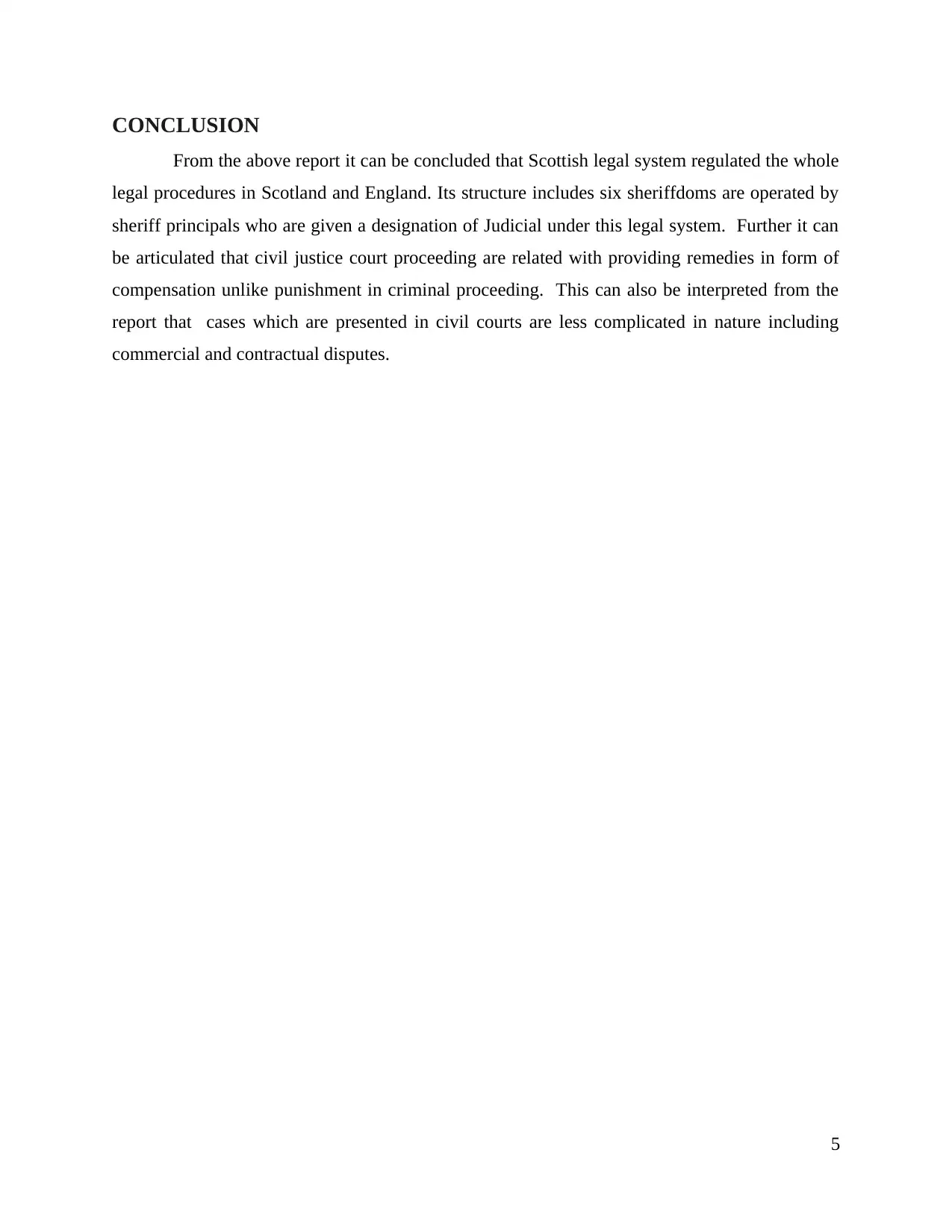
CONCLUSION
From the above report it can be concluded that Scottish legal system regulated the whole
legal procedures in Scotland and England. Its structure includes six sheriffdoms are operated by
sheriff principals who are given a designation of Judicial under this legal system. Further it can
be articulated that civil justice court proceeding are related with providing remedies in form of
compensation unlike punishment in criminal proceeding. This can also be interpreted from the
report that cases which are presented in civil courts are less complicated in nature including
commercial and contractual disputes.
5
From the above report it can be concluded that Scottish legal system regulated the whole
legal procedures in Scotland and England. Its structure includes six sheriffdoms are operated by
sheriff principals who are given a designation of Judicial under this legal system. Further it can
be articulated that civil justice court proceeding are related with providing remedies in form of
compensation unlike punishment in criminal proceeding. This can also be interpreted from the
report that cases which are presented in civil courts are less complicated in nature including
commercial and contractual disputes.
5
Paraphrase This Document
Need a fresh take? Get an instant paraphrase of this document with our AI Paraphraser
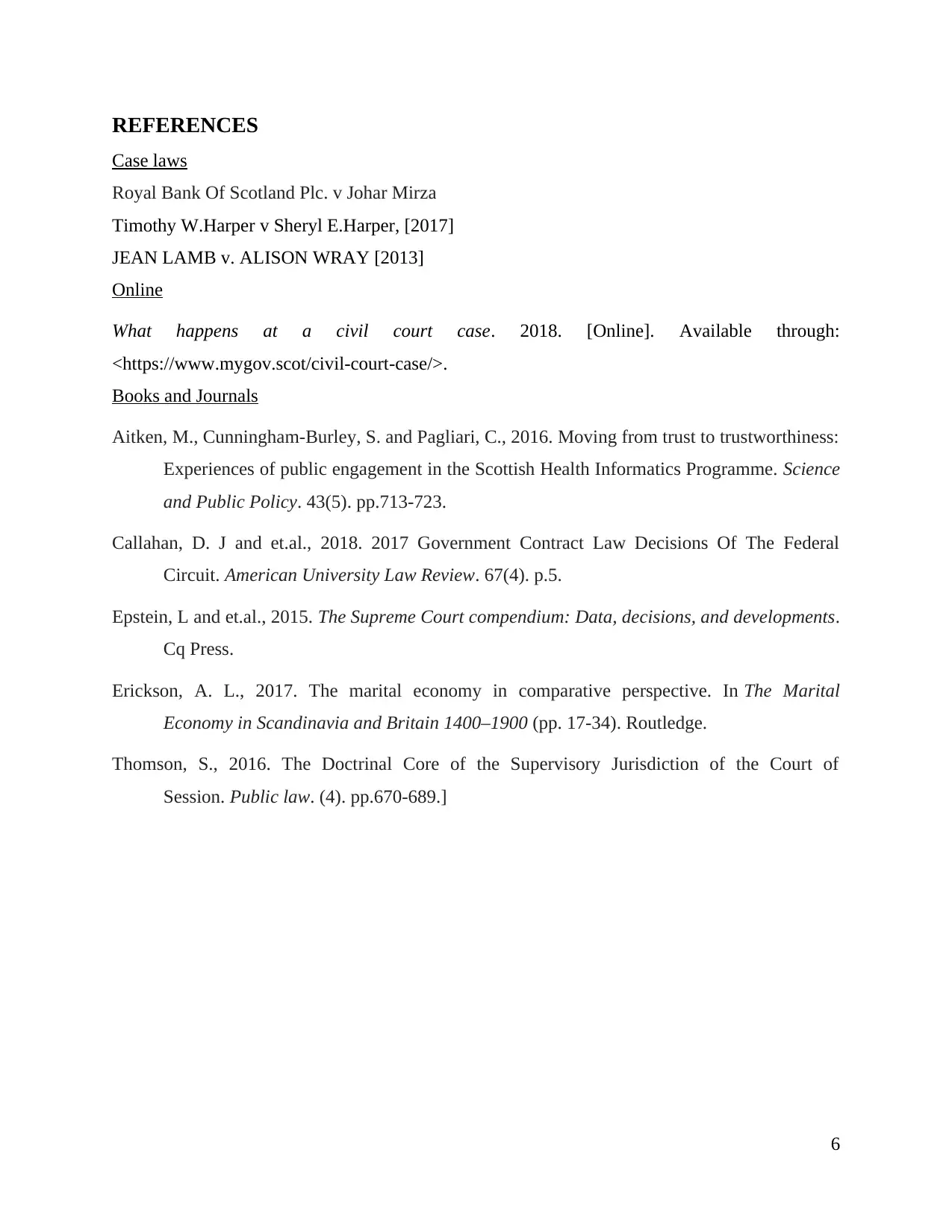
REFERENCES
Case laws
Royal Bank Of Scotland Plc. v Johar Mirza
Timothy W.Harper v Sheryl E.Harper, [2017]
JEAN LAMB v. ALISON WRAY [2013]
Online
What happens at a civil court case. 2018. [Online]. Available through:
<https://www.mygov.scot/civil-court-case/>.
Books and Journals
Aitken, M., Cunningham-Burley, S. and Pagliari, C., 2016. Moving from trust to trustworthiness:
Experiences of public engagement in the Scottish Health Informatics Programme. Science
and Public Policy. 43(5). pp.713-723.
Callahan, D. J and et.al., 2018. 2017 Government Contract Law Decisions Of The Federal
Circuit. American University Law Review. 67(4). p.5.
Epstein, L and et.al., 2015. The Supreme Court compendium: Data, decisions, and developments.
Cq Press.
Erickson, A. L., 2017. The marital economy in comparative perspective. In The Marital
Economy in Scandinavia and Britain 1400–1900 (pp. 17-34). Routledge.
Thomson, S., 2016. The Doctrinal Core of the Supervisory Jurisdiction of the Court of
Session. Public law. (4). pp.670-689.]
6
Case laws
Royal Bank Of Scotland Plc. v Johar Mirza
Timothy W.Harper v Sheryl E.Harper, [2017]
JEAN LAMB v. ALISON WRAY [2013]
Online
What happens at a civil court case. 2018. [Online]. Available through:
<https://www.mygov.scot/civil-court-case/>.
Books and Journals
Aitken, M., Cunningham-Burley, S. and Pagliari, C., 2016. Moving from trust to trustworthiness:
Experiences of public engagement in the Scottish Health Informatics Programme. Science
and Public Policy. 43(5). pp.713-723.
Callahan, D. J and et.al., 2018. 2017 Government Contract Law Decisions Of The Federal
Circuit. American University Law Review. 67(4). p.5.
Epstein, L and et.al., 2015. The Supreme Court compendium: Data, decisions, and developments.
Cq Press.
Erickson, A. L., 2017. The marital economy in comparative perspective. In The Marital
Economy in Scandinavia and Britain 1400–1900 (pp. 17-34). Routledge.
Thomson, S., 2016. The Doctrinal Core of the Supervisory Jurisdiction of the Court of
Session. Public law. (4). pp.670-689.]
6

BIBLIOGRAPHY
https://www.scotcourts.gov.uk/the-courts/sheriff-court/about-sheriff-courts
https://www.mygov.scot/civil-court-case/
http://www.parliament.scot/ResearchBriefingsAndFactsheets/S4/SB_14-15.pdf
https://www.scotcourts.gov.uk/the-courts/supreme-courts/about-the-court-of-session
https://e-justice.europa.eu/content_ordinary_courts-18-sc-maximizeMS-en.do?member=1
7
https://www.scotcourts.gov.uk/the-courts/sheriff-court/about-sheriff-courts
https://www.mygov.scot/civil-court-case/
http://www.parliament.scot/ResearchBriefingsAndFactsheets/S4/SB_14-15.pdf
https://www.scotcourts.gov.uk/the-courts/supreme-courts/about-the-court-of-session
https://e-justice.europa.eu/content_ordinary_courts-18-sc-maximizeMS-en.do?member=1
7
⊘ This is a preview!⊘
Do you want full access?
Subscribe today to unlock all pages.

Trusted by 1+ million students worldwide
1 out of 9
Related Documents
Your All-in-One AI-Powered Toolkit for Academic Success.
+13062052269
info@desklib.com
Available 24*7 on WhatsApp / Email
![[object Object]](/_next/static/media/star-bottom.7253800d.svg)
Unlock your academic potential
Copyright © 2020–2025 A2Z Services. All Rights Reserved. Developed and managed by ZUCOL.





